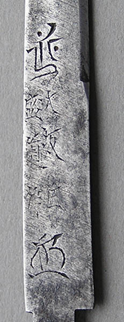-
Posts
13,108 -
Joined
-
Last visited
-
Days Won
157
Content Type
Profiles
Forums
Events
Store
Downloads
Gallery
Everything posted by Bruce Pennington
-
Nice one Hale! I've added your Takehisa to my files of "W" stamped blades. I now have 3 Takehisa with the stamp, all Autumn of '43, all with the same black painted numbers (107, 155, and 608). 155 has similar Type 98 fittings with the thin tsuba. 608 is in Rinji-seishiki fittings. The "W" is stamped as "M" on 155, but as "W" on the other 2. Is your sarute the clasped-hands?
-

Koshirae Fitters Stamping Blades
Bruce Pennington replied to Bruce Pennington's topic in Military Swords of Japan
I know we had a thread going where we were discussing, and comparing examples, of these stamped kabutogane, but I can't find it. The single one on the second pic is the "東" of the Tokyo 1st Army Arsenal inspectors. The center star on the first pic is the emblem of the same Arsenal. The image to the right of the star is definitely an unknown and can be seen better on this one: But I can't make out the one on the left of your star. That's got to be a record for the most stamps on a kabutogane! -
Steve, After seeing your "blued" sayas, it made me think about one of my 95s. It's the one with the mottled green paint that I assumed was a bad Bubba post-war job. I had stripped the greens and what remained was a darkened "blue" finish to the steel. After seeing your 32s with that same finish, I'm starting to think this was a regular finish done, for some reason, on some saya. Apparently it wasn't done to all saya, so why just to some? Maybe it was needed for a particular type of top-coat paint that in use for the moment? (I still regret stripping that green paint!) Dave, sorry for taking your thread off-topic!
-

Koshirae Fitters Stamping Blades
Bruce Pennington replied to Bruce Pennington's topic in Military Swords of Japan
Good one, Thomas! Didn't have that one. I have a Katsumasa - 168, No Date - but now I have 2! I don't see Katsumasa on the RJT listing of the Japaneseswordindex. But the massive majority of these numbered blades are RJT. Does anyone have another source listing of RJT smiths? If so, is he on it? -
Thomas, Excellent idea posting digital images of the stamps in the Gallery. That way we can copy and paste them in the middle of discussions!
-
Really gorgeous, Edward! Good luck on the sale!
-
It sold before I could even get on and say "Dang! What a gorgeous Kai!!!"
-
Same here, and I have a Google account. All I could do was click "request entry" or some such wording. Posting the pics is always the best route. 4 years from now when someone is searching for items like you're talking about, the links are often dead. Posted pics are here for posterity.
-
There are 2 Kanetsugu listed in the Japaneseswordindex.com/oshigata but the "tsugu" is different on both.
-

Morimichi?
Bruce Pennington replied to Bruce Pennington's topic in General Nihonto Related Discussion
After checking Fuller's chart, the kakihan on the right is the one for the WWII smith. The one on the kogatana looks much older, so it's likely another Morimichi of another era. -
That one definitely looks period legit. I don't really follow the 32s and earlier, so I don't have a feel for them. We have discussed black painted 95s quite a bit. Here's a long one: Type 95 Black Saya I think the paint is WWII period on most of these, but like Shamsy says, it's hard to say if it is original or a repaint.
-
Ha! Me too! Thanks Brother!
-
Wish I had some! Yes, it's time to beef up the "Unknowns" section of the Stamps Doc. I PM'd the owner (inactive since 2017), hopefully I can get a pic without the red lines. Thanks Thomas for tormenting me! Ha! I reminds me of this one, but there's differences
-
Stephen, Any date on this?
-
Date is April 1 1945. someone else will have to translate the rest.
-
-
-
After finding the fabulous anti-rust blade for sale, by Ray Singer, with a kakihan, made by "Morimichi" I checked my files and found this Morimichi with kakihan on a kogatana (if I've used the correct term), but they're different kakihan. Are they the same mei? Ray's blade is HERE.
- 1 reply
-
- 1
-

-
I agree with Dave. This looks like a shirasaya, not a field-made koshirae. Value depends on your feel for it's authenticity and your personal preferences for collecting. The pictures don't give sufficient close-up detail to detect hamon, so from a distance, it looks like a badly treated sword, Japanese, but badly treated.
-
And there was no Seki armory. The Seki sword guild made swords for both the Tokyo first arsenal and the Nagoya army arsenal. It mostly means that the blade was not made in the traditional way.
-
Hi Steve, welcome! I hope you realize we're not going to let you get away with such a tease without ponying up some pictures! I did the same thing for my Dad's Mantetsu. I got it at no cost, so it was easy for me to spend the dollars to have the blade polished. You'll find several links in the tab above titled "Nihonto Info". The first item in the drop-down menu is "Links", then go to the "Commercial" pages. You'll find polishers as well as guys that can restore the fittings. That tab is a bit dodgy - it disapears on me several times before I can get it to stay still long enough to get over to the Commercial pages. For a more direct answer on who we recommend, it sort of depends upon the particular blade. So pictures of the full blade, naked, and the tang (nakago) are needed.
-
Thanks Brian, and nice work on the description you gave for the star stamp. A bit better than anything I could have written. I had thought the same thing as you did about adding poor examples with the good so that people could recognize a poor one for what it is, but there are so many permutations of poorly struck stamps that I decided to stick with the full image. I'll keep adding to them as time allows. Great idea, Brian, on the reference page! Sometimes you just need a single picture to add to a discussion and this page is a quick and easy place to find what you need.
-
Thanks David! It represents the unknowns we face in trying to study these WWII pieces of history. I like your theory as we discussed on your Matsu Stamp thread. After seeing other RJT certified blades with numbers, but not the Matsu, I'm leaning toward it being a personal mark chosen by the Yamagami brothers. But your idea of it's meaning may have been what appealed to them as they chose a mark.
-

Need Help with a Katakana
Bruce Pennington replied to Bruce Pennington's topic in Translation Assistance
Thanks Thomas. That's the first kana-led number I've seen prior to 1944. The matsu numbers were earlier, but this is the first non-matsu number prior to '44 that I've seen. If someone could take a snap shot of that page, I'd love to add it to the files.









